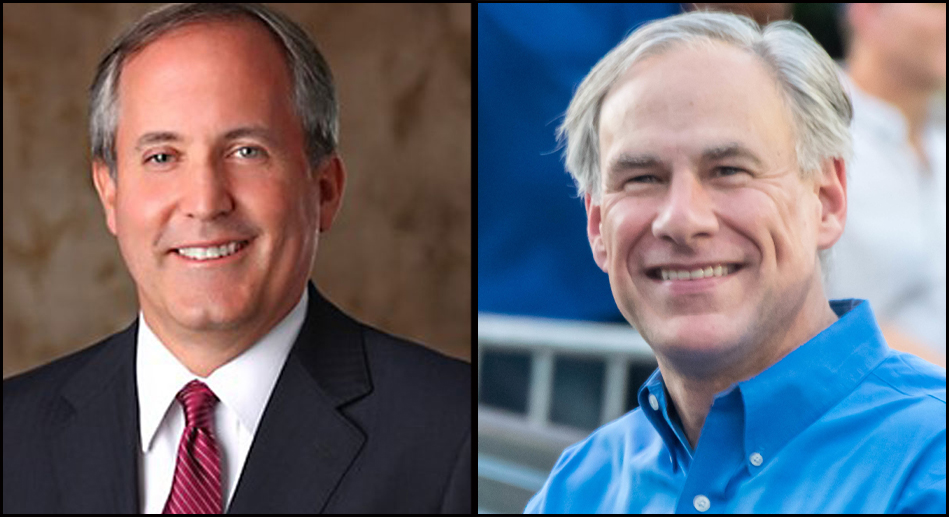
Texas Attorney General Ken Paxton, left, and Gov. Greg Abbott
Gov. Greg Abbott and Attorney General Ken Paxton on Wednesday, April 1, issued joint guidance regarding the effect of Executive Order GA 14 on religious services conducted in congregations and houses of worship.
Executive Order GA 14 defines essential services to include “religious services conducted in churches, congregations and houses of worship.” Orders given by state or local governments prohibiting people from providing or obtaining certain services must ensure that the orders do not violate the First Amendment of the United States Constitution, Article I of the Texas Constitution, and the Texas Religious Freedom Restoration Act, which protect the rights of Texans to freely exercise their religion, Paxton and Abbott said.
Paxton said, “All Texans must work together to stop the spread of COVID-19, and houses of worship face a particular challenge as we work to combat this pandemic. This guidance provides clear direction for houses of worship to protect the health and safety of Texans as they continue to hold religious services, exercise their religious liberty, and serve their faith communities.”
The guidance notes that the 1st Amendment to the U.S. Constitution and Article I of the Texas Constitution both protect the right to the free exercise of religion, and that the Texas Religious Freedom Restoration Act “provides even stronger protections to faith communities, and government must ensure that it complies with RFRA when it acts.” The guidance says that any time orders and regulations handed down from county or city governments contradict Abbott’s order, Abbott’s order supersedes the others.
The guidance does not, however, give churches and other houses of worship permission to return to pre-COVID-19 business as usual
Abbott’s order notes that “houses of worship provide ‘essential services,’” but houses or worship, like other “essential” businesses, must follow guidelines established by The White House and the Centers for Disease Control.
Houses of worship should, whenever possible, conduct their services via remote audio, video or teleconference whenever possible. Those that are unable to do so “due to a lack of capability (technological or financial),” should follow make sure they follow guidelines in place to mitigate the spread of COVID-19. This guidelines including making sure all employees, volunteers or guests who are sick stay home, practicing appropriate social distancing, maintaining good hygiene (washing your hands frequently, using hand sanitizers, covering your cough with your elbow, not touching your face), and of course, cleaning and disinfection work areas frequently.
The guidance also instructs that “Some houses of worship must avoid large gatherings,” and urges houses of worship to “work with counties and municipalities to evaluate the rate of local community spread and determine the appropriate levels of mitigation strategies.”
For example, if a community is “experiencing substantial community spread of COVID-19” — say, for instance, like in Dallas and Fort Worth — “houses of worship in that community should cancel all in-person gatherings of any size.”
Houses of worship in communities where community spread of the disease is conserved moderate to substantial should reduce activities. The order leaves open, however, the possibility that houses of worship in these communities could possibly hold smaller gatherings with proper social distancing in place. They should still cancel activities where 10 or more people might attend including those in high-risk groups and “use creative means to deliver other faith-based services.”
Such “creative means” could include holding Easter Sunday services in the church parking lot where people could park in every other parking spot while staying in their cars and rolling down their windows to hear the sermon.
“Because Executive Order GA 14 permits drive-thrus to operate, then a house of worship may, according to their faith practices, provide communion or a blessing through a similar drive-up service. Or pastors with smaller congregations may consider conducting multiple services of 10 people or fewer in their sanctuaries, so long as they maintain appropriate social distancing, properly sanitize the building between each service, and provide hand sanitizer,” the guidance suggests.
The guidance ends with the declaration that such restrictions “do not violate the religious liberty of houses of worship” because the government does, indeed, “have a compelling interest” implementing the restrictions.
Read the entire joint guidance document here.
— Tammye Nash












Hey Church Friends,
I hope you’re doing well! I just wanted to give you some helpful ideas for outreach in response to the Coronavirus (Covid-19). Here are some easy steps your church could do – https://bit.ly/3aDGYsj
Feel free to share this with anyone on your team that might find it helpful. If you have questions feel free to email me at hello@jonathanconnolly.com or if you need further assistance you can book a 15min phone meeting here – https://bit.ly/2xKOJ0Y
Stay healthy!
Jonathan